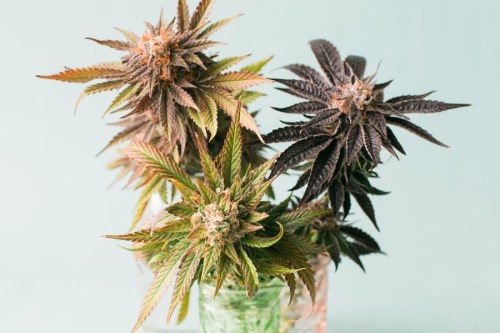CBD regulation will pave the way for a boom of new products
Our prediction: 2019 will be the year CBD regulation passes and CBD sees its mainstream potential (think: Coca-Cola, Recess', and Yuyo Botanics).

If 2018 was the year that CBD started seeping into everything—from our skin care to our cinnamon rolls—2019 will be the year the world stops perceiving it as a niche wellness fad and sees its mainstream potential. Why? Well, once the 2018 Farm Bill finally passes (any day now!), hemp-based CBD cultivation is expected to become legal nationwide.
Industry experts believe this will clear up the current confusion around the hemp plant’s legality, making retailers, scientists, and manufacturers more comfortable working with it—and paving the way for a tidal wave of research, product innovation, and distribution of hemp products.
To be clear, we’re talking about cannabidiol, a non-intoxicating compound in hemp and cannabis plants that’s credited with relieving anxiety, insomnia, pain, and inflammation. (Though rigorous studies backing up those claims are scarce, due to the current regulatory landscape.) And to put the hunger for CBD into perspective, the market for hemp-based CBD could top $22 billion by 2022, according to cannabis industry research firm The Brightfield Group. Yep, $22 billion. In contrast, turmeric—another plant ingredient with lots of hype surrounding it—raked in $11 billion in the US in 2017.
“[Expect] stricter requirements about how people are making claims about cannabinoids.” —Christopher Gavigan, CEO Prima
That said, experts still commonly refer to the CBD market as the “wild west,” and there are many issues to address before it can truly ascend to the next level. For one thing, it’s a totally unregulated industry right now. “A lot of [beauty and supplement] brands are aligning with the CBD [trend] without actually using CBD,” says Anna Duckworth, co-founder and editor-in-chief of Miss Grass, an elevated lifestyle shop and publication for women and cannabis. Various brands have been called out for using hemp seed oil and calling it “cannabis oil”—when, really, this part of the plant contains negligible levels of cannabinoids. (It’s the flowers of the hemp plant, not the seeds, that contain the most CBD.)
Actual standards for CBD products could be coming, though, if the 2018 Farm Bill passes as expected. “[Expect] stricter requirements about how people are making claims about cannabinoids,” says Christopher Gavigan, co-founder of the The Honest Company and CEO of soon-to-launch hemp CBD brand and education platform Prima.
Miss Grass CEO Kate Miller and Duckworth predict we’ll start seeing CBD brands touting sustainable sourcing, transparency, and giving back as a way to distance themselves from shadier players in the market. (Look to Juna, a new CBD oil brand as an example of a company touting “single-origin” ingredients and ultra-clean extraction processes.) And Cannabis Feminist founder Jessica Assaf, Prima’s co-founder, predicts that we’ll see a new wave of products that emphasize bioavailability—ones that are more easily absorbed and utilized by the body than the standard CBD oils and tinctures —in “new formats that work with the modern lifestyle.”
Jenny Sansouci, health coach and writer behind Healthy Crush, is particularly excited to see more CBD products for women’s health, noting that cannabis-based sexual wellness brand Foria is about to launch a line of CBD-only products (think suppositories for period pain and an intimate massage oil).
CBD protein powders, pain-relief patches, and vaporizer pens are also filtering into the market, and there’s a growing number of brands combining CBD with other herbal ingredients. Recess’ new line of adaptogenic CBD seltzers is creating a buzz, while Yuyo Botanics offers a CBD tincture with ashwagandha, plus peppermint and lemon.
It won’t just be startups contributing to the impending green rush, either. Coca-Cola is rumored to be experimenting with CBD in Canada, while the first FDA-approved pharmaceutical utilizing synthetic CBD, an epilepsy drug called Epidiolex, became available in the US in November. Laurel Myers, Prima’s COO, says it’s hard to predict exactly what kind of impact big business (and its big research dollars) will have on the nascent CBD industry, but she’s hopeful that it will be a positive one. “The more people you have looking at this and trying to crack the code, the better,” she says. “We’ll learn more, know more, and it will hopefully help broaden the impact on people’s lives.”
This is just one of the healthy-living trends we’re predicting for 2019—check out the full list here!
Sign Up for Our Daily Newsletter
Get all the latest in wellness, trends, food, fitness, beauty, and more delivered right to your inbox.
Got it, you've been added to our email list.










